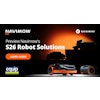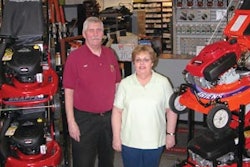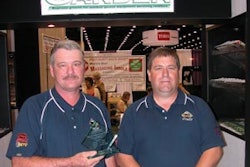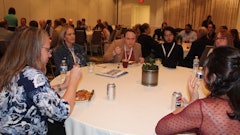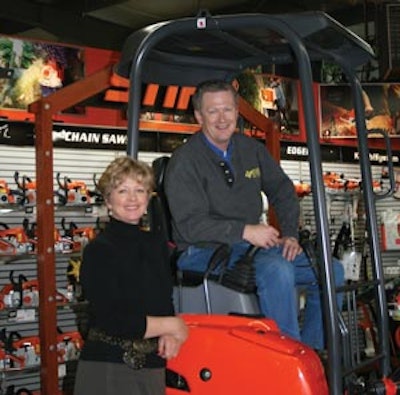
Moen Machinery moves a ton of iron. From a single location in Gresham, OR, the dealership’s wholegoods sales alone dwarf the total volumes of many reputable dealers. But bigger isn’t always better, which is why co-owner Greg Moen keeps his eye on the larger prize: customer loyalty and healthy profits, both of which enable the business to continue growing.
And grow it has. Cindy Luebbers, Moen’s sister who’s also a co-owner, says her nerves act up from time to time. Like a lot of dealerships, especially those with substantial commercial customer bases, Moen Machinery is busting at the seams. Virtually every square inch of available land is already in use, leaving no room to expand at the current location. In fact, Moen Machinery sometimes has to “borrow” lot space from the RV dealership across the street to store some of the big iron it sells. It’s a good thing Moen networks the way he does; he’s chummy with the owner of that RV dealership.
Relocating has been discussed on more than one occasion, but doesn’t appear to be the best thing for Moen Machinery at the present time. The dealership benefits greatly from the high amount of traffic passing by its doors each day. “Plus, zoning in our area limits our choices when it comes to relocating,” Moen points out. “We don’t want to move so far out in the country that we risk losing some of our residential and lawn maintenance contractor business,” Luebbers adds.
Nobody likes to lose customers, at least not the good ones. Moen Machinery has spent the last six decades finding—and keeping—a lot of great ones, from a variety of pro and homeowner segments.
Big iron ... big opportunities
The dealership has a 60-year history of shifting with its market. It started out as a farm supply store. When the logging industry began showing promise, Moen Machinery evolved into more of a saw shop. Then it was back to ag, with a continued emphasis on logging. In the late 1960s, due to a tremendous surge in development, the Gresham area saw traditional ag farmers transitioning to nurseries. “That’s when we changed from being primarily an ag dealership to being a more diversified business,” Moen says.
That’s also about the same time Moen Machinery took on the Kubota line. “We became a lawn and garden/agricultural/light industrial store encompassing several customer categories,” Moen tells. “The Kubota line has taken us in directions we never thought we’d go. Had we needed to take on several different lines to achieve the same market coverage, I don’t think we would have.”
As Moen points out, dealing with one supplier makes expanding into different product categories much easier. You have one set of financing and purchasing programs to learn, while your parts and service staff have just one more line to become familiar with.
Learn what you’re selling ... and selling against
Perhaps most importantly, your sales reps have but one line of new equipment to learn how to sell. And they’re going to have to learn it—inside and out. Moen says professional customers, especially those on the industrial side, are pretty educated when it comes to product. “Many times they know more about our competition than we do,” Moen relates.
David Dirksen, a Moen family cousin who works in the sales department, says the biggest key to winning pro business has been knowing competitors’ equipment so he and the three other Moen Machinery sales reps can sell more effectively. “That’s been the hardest part in selling this bigger equipment,” Dirksen relates. “It requires a lot of studying on our part so we can approach each customer and make them feel confident we know what we’re talking about. We have to know what we’re selling, and also what our competition is selling.”
Moen says he’s lucky because his suppliers, particularly Kubota, have been very helpful in providing as much competitive information as possible. His suppliers have also done a good job of expanding their product lines over the years, enabling Moen Machinery to reach a broader customer base.
That broader customer base includes a homeowner segment that continues to grow. Moen Machinery’s location allows it to draw hobby farmers on the outskirts of town, and everyday homeowners who reside inside the city. Zero-turns, tractors, walk mowers and handheld are the big movers here.
On the commercial side, which represents about 40% of the dealership’s customer base, Moen Machinery continues to cater to a variety of segments. There are many similarities between them, such as the need for outside sales and prompt equipment service. Each segment also has unique needs, sometimes requiring a slightly different sales approach.
Building loyalties one segment at a time
For Moen Machinery, just like with the equipment it sells and sells against, it’s really all about knowing each customer inside and out.
Nurseries. Moen Machinery has actually been working with this customer group since its founding in 1947, at that time providing Bolens tractors for traveling in between the rows of nursery stock. Since nursery stock is now the largest agricultural crop in Oregon, this segment has become Moen Machinery’s biggest on the commercial side. The dealership still provides tractors for traveling in between rows, along with general field work and loading/shipping tasks. Articulated wheel loaders have also become popular for handling palletized stock.
SALES TIP: Moen Machinery stays involved with the state-wide Oregon Association of Nurseries by participating in chapter meetings and exhibiting at the Farwest Nursery Show. Moen says outside sales are also required to establish relationships with the individual nurseries and determine their equipment needs. Each of Moen Machinery’s four sales reps has his own truck. A dedicated delivery person is also on the payroll.
Light industrial. This is the dealership’s fastest-growing market segment, thanks to the increasingly popular compact excavator. It’s helped Moen Machinery earn business from building contractors, municipalities, utility companies and even landscapers.
SALES TIP: Outside sales and product demonstrations are extremely important. “You need to be able to show how versatile the compact excavator is for a broad range of jobs,” Moen says. Industrial customers also require your sales reps to have a higher level of product knowledge, and are often more sensitive to pricing concerns.
Landscapers. While not as large a market as nurseries, the landscape segment has been integral and continues to grow. Zero-turns, walk-behinds and handheld are the big movers.
SALES TIP: Many landscape customers also require outside sales to establish relationships and demo product. To help ensure fast turnaround on repairs, Moen Machinery gives landscapers priority in the shop. Loaner equipment is available for emergency situations.
Juggling Act
In addition to product knowledge, Dirksen says giving commercial customers priority in the shop is why Moen Machinery has had success with so many pro segments. Sometimes it can be a challenge, since the dealership serves so many professionals from so many different industries. No one pro customer is more important than the other, so precise planning and organization in the shop is essential.
Each of Moen’s experienced technicians is assigned to a specific area of the business, including diesel, lawn and garden, handheld and commercial landscape (zero-turns). This kind of “division of labor” helps ensure prompt service turnaround for everyone, including homeowners.
In the midst of all the fuss over landscapers, building contractors, nurseries and governmental accounts, Moen says it’s important to not lose sight of the valuable residential segment. After all, it represents 60% of Moen Machinery’s customer base and continues to grow. That’s why Moen Machinery also offers loaners to homeowners when needed. And it’s why the dealership has juggled some things around in the showroom to create a more pleasing shopping environment for consumers.
Stihl Concept Store displays have been in place for 10 years. Moen recently ordered a similar package for the opposite side of the showroom to display Honda generators, pumps and trimmers. The dealership put in a series of shelves to merchandise what Dirksen likes to call “grab and go” items such as oil, gas cans, work gloves, etc. right up front. The shelves have boosted parts and accessories sales dramatically.
Along with the showroom and merchandising changes, Moen Machinery has altered its hours of operation to make it more convenient for customers—without causing too much of an increase to payroll. The dealership is now open 8-7 M-F, 8-5 Saturday, and is closed on Sunday.
“Smart, skeleton staffing is the key,” Dirksen says. “We only keep a couple people here after 5, and keep a limited shop staff on Saturdays.”
Creating a clean and attractive facility customers will want to come to is one of Greg Moen’s three keys for growth and prosperity. The other two are good employees and product lines you can make a profit selling. You certainly can’t argue with that.
But Moen left one thing out: You also need a management team of consummate pros to steer the boat in the right direction. Moen Machinery is a pretty large boat. Throughout its 60 years in business, it’s naturally hit some rough waters. But it’s never come close to capsizing. For now, it looks like some smooth sailing ahead.

